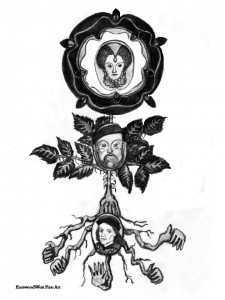St. Pyro
Posted in General, On This Day on February 25th, 2010 by Eugene Finerman – 3 CommentsFebruary 25, 1570: It Now Is Permissible (what is Latin for Kosher?) To Assassinate Elizabeth I
Pope Pius V was not exactly your Barry Fitzgerald type of priest. Instead, just imagine if Josef Stalin had decided to stay in the seminary. Born in Italy, but with a Spanish personality, the young Antonio Ghislieri joined the Dominician Order where he found kindred psychopaths. He volunteered for the Inquisition and displayed a zealous piety. The Inquisitor was especially suspicious of the well-educated, believing that literacy and heresy were synonymous. To his frustration, however, the Italian Inquisition was more inclined to burn books rather than people. (In Spain, you could do both!)
Yet, his personal austerity earned him the support of the “reformist” faction within the Church; these were the cardinals who felt that Popes should have religious wars instead of mistresses. In 1566, on the death of Pius IV (your typical nepotic rascal), the reformers elected their favorite inquisitor as the next pope. Although 62 at the time, bigotry kept him young. As Pius V, of course he persecuted Jews but that was a mere formality. His real interest was in exterminating Protestants and he had an eventful six year reign. He officially gave Spain permission to wipe out the Dutch. (Without the Pope’s permission, the Dutch did defend themselves.) The Pope encouraged France’s Catholics to kill the Huguenots; he died a few months too soon to enjoy the St. Bartholomew’s Massacre but he must have been there in spirit. On this day in 1570, he declared Queen Elizabeth a heretic and ordered her overthrow and death; however, the Catholics were a minority and those who tried to comply with the Papal directive generally found themselves disemboweled by the Queen’s Secret Service.
Ironically, the Pope did not like the idea of hurting animals and forbade bullfighting. This was one Papal directive that Spain ignored.
In 1712, Pius V was declared a saint. PETA might agree even if Protestants and Jews don’t.
